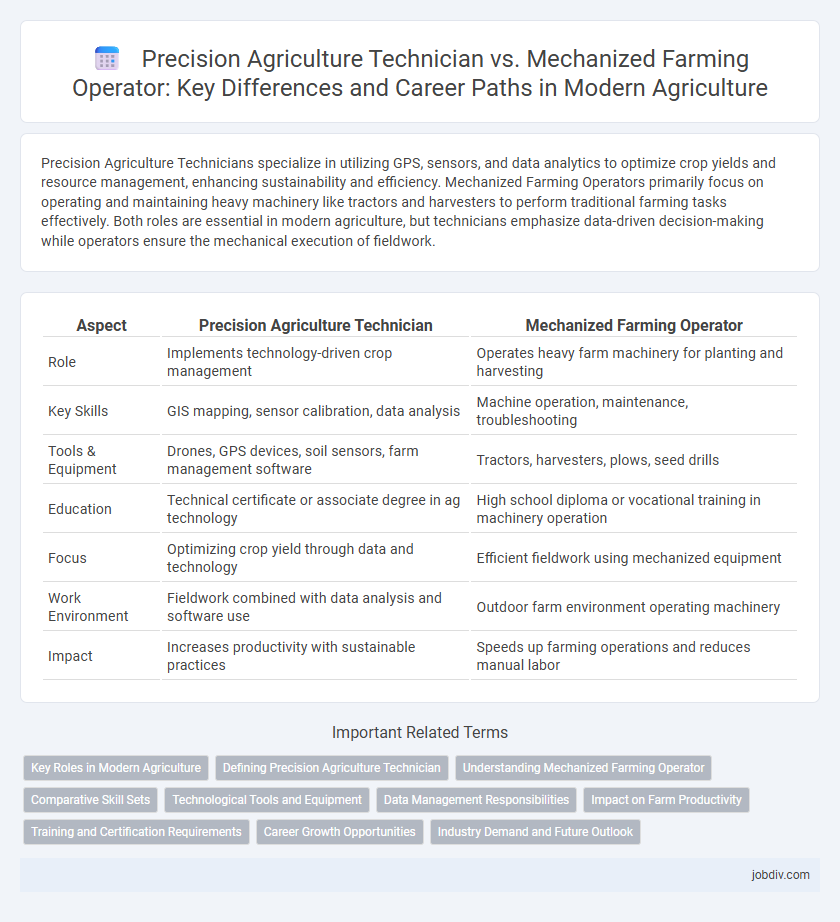Precision Agriculture Technicians specialize in utilizing GPS, sensors, and data analytics to optimize crop yields and resource management, enhancing sustainability and efficiency. Mechanized Farming Operators primarily focus on operating and maintaining heavy machinery like tractors and harvesters to perform traditional farming tasks effectively. Both roles are essential in modern agriculture, but technicians emphasize data-driven decision-making while operators ensure the mechanical execution of fieldwork.
Table of Comparison
| Aspect | Precision Agriculture Technician | Mechanized Farming Operator |
|---|---|---|
| Role | Implements technology-driven crop management | Operates heavy farm machinery for planting and harvesting |
| Key Skills | GIS mapping, sensor calibration, data analysis | Machine operation, maintenance, troubleshooting |
| Tools & Equipment | Drones, GPS devices, soil sensors, farm management software | Tractors, harvesters, plows, seed drills |
| Education | Technical certificate or associate degree in ag technology | High school diploma or vocational training in machinery operation |
| Focus | Optimizing crop yield through data and technology | Efficient fieldwork using mechanized equipment |
| Work Environment | Fieldwork combined with data analysis and software use | Outdoor farm environment operating machinery |
| Impact | Increases productivity with sustainable practices | Speeds up farming operations and reduces manual labor |
Key Roles in Modern Agriculture
Precision Agriculture Technicians specialize in data collection, analysis, and implementation of technology such as GPS, sensors, and drones to optimize crop yields and resource management. Mechanized Farming Operators focus on operating and maintaining heavy machinery like tractors, harvesters, and planters to perform essential fieldwork efficiently. Both roles are crucial for modern agriculture, combining advanced technology and mechanization to enhance productivity and sustainability.
Defining Precision Agriculture Technician
A Precision Agriculture Technician specializes in utilizing advanced technologies such as GPS, remote sensing, and data analytics to optimize crop production and resource management. This role requires expertise in interpreting soil, weather, and crop data to implement site-specific farming practices that enhance yield and sustainability. Unlike a Mechanized Farming Operator, who primarily focuses on operating and maintaining agricultural machinery, the technician integrates technological tools to improve decision-making and field efficiency.
Understanding Mechanized Farming Operator
A Mechanized Farming Operator specializes in operating and maintaining agricultural machinery such as tractors, harvesters, and planters to enhance farm productivity and efficiency. Their expertise includes calibrating equipment for optimal performance, troubleshooting mechanical issues, and ensuring timely implementation of farming operations in various crop cycles. Unlike Precision Agriculture Technicians who focus on data-driven techniques and technology integration, Mechanized Farming Operators concentrate on the hands-on operation and mechanical functionality of farming equipment.
Comparative Skill Sets
Precision Agriculture Technicians specialize in data analysis, GPS technology, and variable rate application to optimize crop yields and resource management. Mechanized Farming Operators focus on the operation and maintenance of heavy machinery such as tractors, harvesters, and irrigation equipment to ensure efficient fieldwork. While Precision Agriculture Technicians emphasize technological integration and real-time monitoring, Mechanized Farming Operators prioritize hands-on mechanical skills and equipment handling.
Technological Tools and Equipment
Precision Agriculture Technicians utilize advanced technological tools such as GPS-guided machinery, drones, and soil sensors to optimize crop management and resource efficiency. Mechanized Farming Operators primarily handle heavy machinery like tractors, harvesters, and plows, focusing on the physical operation of equipment in field tasks. The integration of data analytics and automated systems is a key differentiator for Precision Agriculture Technicians, enhancing decision-making and precision in farming practices.
Data Management Responsibilities
Precision Agriculture Technicians specialize in collecting, analyzing, and managing data from GPS, sensors, and drones to optimize crop yields and resource use. Mechanized Farming Operators primarily focus on operating and maintaining farming machinery, with less emphasis on detailed data management. Effective data management by Precision Agriculture Technicians enables targeted interventions that improve efficiency and sustainability in modern agriculture.
Impact on Farm Productivity
A Precision Agriculture Technician enhances farm productivity by utilizing GPS technology, data analytics, and remote sensing to optimize planting, fertilization, and irrigation processes, resulting in more efficient resource management and higher crop yields. In contrast, a Mechanized Farming Operator focuses on operating and maintaining heavy machinery such as tractors and harvesters, which increases the speed and scale of farm operations but may not directly contribute to precision in resource application. Integrating both roles on a farm leads to improved overall productivity, combining technological accuracy with effective machinery operation.
Training and Certification Requirements
Precision Agriculture Technicians typically require specialized training in GPS technology, data analysis, and software applications, often obtained through technical certifications or associate degrees in precision agriculture or agronomy technology. Mechanized Farming Operators focus on operating, maintaining, and repairing agricultural machinery, with training provided through vocational programs, on-the-job experience, or certifications in heavy equipment operation and maintenance. Both roles benefit from industry-recognized credentials, but Precision Agriculture Technicians emphasize digital and analytical skills, whereas Mechanized Farming Operators prioritize mechanical and equipment expertise.
Career Growth Opportunities
Precision Agriculture Technicians experience rapid career growth due to increasing adoption of technology-driven farming methods, including GPS mapping, drone usage, and data analytics that enhance soil and crop management. Mechanized Farming Operators see steady opportunities as demand for skilled operators of tractors, harvesters, and other equipment remains essential for large-scale agricultural production. The growing emphasis on sustainability and efficiency in agriculture further accelerates advancement potential for precision agriculture professionals.
Industry Demand and Future Outlook
Precision Agriculture Technicians are experiencing rising industry demand due to advancements in GPS technology, data analytics, and remote sensing, which enhance crop productivity and resource management. Mechanized Farming Operators continue to be essential for large-scale operations, benefitting from innovations in automated machinery and equipment maintenance. The future outlook favors Precision Agriculture Technicians as farms increasingly adopt smart technologies, although skilled operators remain critical for efficient mechanized farming workflows.
Precision Agriculture Technician vs Mechanized Farming Operator Infographic

 jobdiv.com
jobdiv.com